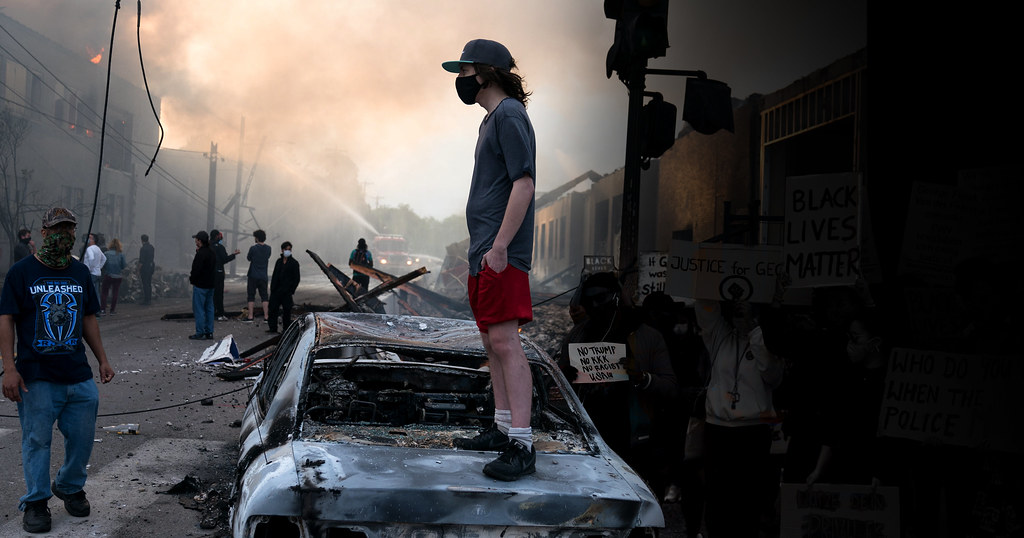A Chulalongkorn University (CU) journalism expert says the way the Thai media covers protests without enough context influences people’s perception. She encourages journalists to conduct more investigative reports rather than event-based news focused on violence and confrontation.

A man stands on a burned out car on Thursday morning as fires burn behind him in the Lake St area of Minneapolis, Minnesota., Photo was taken on 28 May 2020 (Source: Lorie Shaull/Wikipedia)
Since the Black Lives Matter (BLM) protests have gained worldwide attention, most Thai mainstream media have reported on the protests by emphasizing the episodic recounting of events and their consequences rather than providing context and analysis.
Confrontation and violence became the focus of attention in Thailand as the media tried to attract audiences with their reporting. The formula is to depict the negative outcome resulting from the protests. Take these headlines for example:
Thais Caught in U.S. Unrest over Police Brutality
Robbing, burning, destruction, anti-racism protest becomes riot
This depiction of protests seems to have become normalized in the Thai media, be it the BLM or any other protest. Apart from the short-sighted benefit of attracting eyeballs, there may be something else.
Prachatai English interviewed Dr Phansasiri Kularb, a lecturer at the Faculty of Communication Arts, CU, and an expert on the role of journalism amid political conflicts, and asked her to address the phenomenon and its impact on the public.
Perceived Reality
Phansasiri mentioned that the media tend to portray protests as violent by selecting certain aspects of the event to draw the audience’s attention. Such portrayals can delegitimize the movement as the public overlooks the reason why the protests occurred in the first place.
A clear example is in the recent BLM movement in the United States. News reports focussing on vandalism, looting, and destruction overwhelmed the mass media. Despite conveying some truth, such coverage may not reflect the whole protest and demonises the protesters. This could weaken the political implications of the movement.
“The protesters who have committed crimes should be prosecuted according to the law but they shouldn’t be stigmatized for doing so. We should try to understand and have empathy towards them.” Phansasiri commented.
Phansasiri stated that the language used in news reports also creates different perceptions. A word ‘
Another clearer example is the Thai Red Shirts’ protest in May 2010. The discourse “เผาบ้านเผาเมือง” (burning down the homeland) has become a representation of this protest. Such discourse disparages the protesters and largely undermines their role as vital actors on the political stage.
Phansasiri shared her experience that during the protest in May 2010, the Thai mass media mostly used the burning of Central World as the news frame but the UK media used the picture of the military crackdown.
One-sided views of events overlook the fact that the media is barely holding the authorities accountable. The question of whether policing is an important factor in escalating violence or causing riots is still left unanswered.
In some contexts, the media deliberately depend on state officials for gathering information as such sources are considered more easily accessible and reliable. The CU lecturer suggests that the media can do better by gathering information from different groups.
“It’s unacceptable to partially report the events and push all the burden to the audience and let them think for themselves. Journalists must keep the question in mind whether they’re equipped to fully inform the readers” Phansasiri said.
Business and culture change needed
Phansasiri suggests changes from the current news production culture and business profit model that encourage prompt, event-based news in favour of a more comprehensive, informative and impartial form of journalism.
“If we want to minimize the superficiality of the news report, the news industry should change the model of gaining income, in which they could earn more money from doing investigative reports for impartially well-informed reports,” Phansasiri said.
The media also needs to challenge the assumptions made during the protests not only that the confrontations between police and protesters are highlighted, as Phansasiri said, but that the state authorities or other stakeholders who are being challenged are barely called into question.
“The narrative of the majority of the protesters who protest non-violently or tried to prevent people from breaking into the stores is often lost in the mass media,” Phansasiri said. “When these protesters are exploited and suppressed, no one really cared or tried to understand their grievances because these messages were also lost.”
Prachatai English is an independent, non-profit news outlet committed to covering underreported issues in Thailand, especially about democratization and human rights, despite pressure from the authorities. Your support will ensure that we stay a professional media source and be able to meet the challenges and deliver in-depth reporting.
• Simple steps to support Prachatai English
1. Bank transfer to account “โครงการหนังสือพิมพ์อินเทอร์เน็ต ประชาไท” or “Prachatai Online Newspaper” 091-0-21689-4, Krungthai Bank
2. Or, Transfer money via Paypal, to e-mail address: [email protected], please leave a comment on the transaction as “For Prachatai English”
